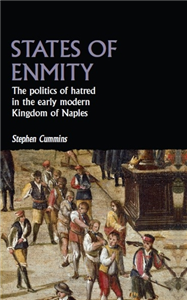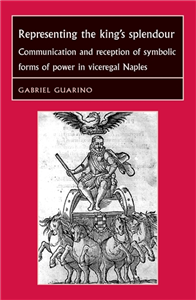Your Search Results
-
Promoted Content
-
Promoted ContentFebruary 2006
Nach Norden
Alvins Abenteuer bei den Inuit
by Napoli, Donna Jo / Übersetzt von Kollmann, Birgitt
-
 Trusted Partner
Trusted Partner
-
 Trusted Partner
Children's & YAAugust 2006
Trusted Partner
Children's & YAAugust 2006Donata, Tochter Venedigs
Historischer Roman
by Napoli, Donna Jo / Englisch Braun, Anne L.
-
 Trusted Partner
Trusted Partner
-
 Trusted Partner
Trusted Partner
-
 Trusted Partner
Trusted Partner
-
 Trusted Partner
Trusted Partner
-
 Trusted Partner
Humanities & Social SciencesDecember 2024
Trusted Partner
Humanities & Social SciencesDecember 2024States of enmity
The politics of hatred in the early modern Kingdom of Naples
by Stephen Cummins
State of enmity explores how relations of hatred and enmity played political and social roles in the early modern Kingdom of Naples. Exploring the pervasive notion of enmity and practices of reconciliation, the book provides new insight into the social dynamics of southern Italy in the early modern period. In particular, widespread banditry and the violent tenor of local politics are analysed through a wide variety of criminal trials and other sources.
-
 Trusted Partner
Children's & YAJune 2008
Trusted Partner
Children's & YAJune 2008Jojo macht das schon – Viermal Pizza Napoli
by Ludwig, Sabine / Illustriert von Ludin, Marine
-
 Trusted Partner
Trusted Partner
-
 Trusted Partner
Humanities & Social SciencesJuly 2020
Trusted Partner
Humanities & Social SciencesJuly 2020Race talk
Languages of racism and resistance in Neapolitan street markets
by Antonia Lucia Dawes
This electronic version has been made available under a Creative Commons (BY-NC-ND) open access license. Race talk is about language use as an anti-racist practice in multicultural city spaces. The book contends that attention to talk reveals the relations of domination and subordination in heterogeneous, ethnically diverse and multilingual contexts, while also helping us to understand how transcultural solidarity might be expressed. Drawing on original ethnographic research conducted on licensed and unlicensed market stalls in in heterogeneous, ethnically diverse and multilingual contexts, this book examines the centrality of multilingual talk to everyday struggles about difference, positionality and entitlement. In these street markets, Neapolitan street vendors work alongside documented and undocumented migrants from Bangladesh, China, Guinea Conakry, Mali, Nigeria and Senegal as part of an ambivalent, cooperative and unequal quest to survive and prosper. As austerity, anti-immigration politics and urban regeneration projects encroached upon the possibilities of street vending, talk across linguistic, cultural, national and religious boundaries underpinned the collective action of street vendors struggling to keep their markets open. The edginess of their multilingual organisation offered useful insights into the kinds of imaginaries that will be needed to overcome the politics of borders, nationalism and radical incommunicability.
-
 Trusted Partner
Art & design styles: BaroqueOctober 2016
Trusted Partner
Art & design styles: BaroqueOctober 2016The matter of miracles
Neapolitan baroque architecture and sanctity
by Series edited by Amelia Jones, Helen Hills, Marsha Meskimmon
This book investigates baroque architecture through the lens of San Gennaro's miraculously liquefying blood in Naples. This vantage point allows a bracing and thoroughly original rethink of the power of baroque relics and reliquaries. It shows how a focus on miracles produces original interpretations of architecture, sanctity and place which will engage architectural historians everywhere. The matter of the baroque miracle extends into a rigorous engagement with natural history, telluric philosophy, new materialism, theory and philosophy. The study will transform our understanding of baroque art and architecture, sanctity and Naples. Bristling with new archival materials and historical insights, this study lifts the baroque from its previous marginalisation to engage fiercely with materiality and potentiality and thus unleash baroque art and architecture as productive and transformational.
-
 Trusted Partner
Humanities & Social SciencesDecember 2010
Trusted Partner
Humanities & Social SciencesDecember 2010Representing the King's Splendour
Communication and reception of symbolic forms of power in Viceregal Naples
by Gabriel Guarino, Joseph Bergin, Penny Roberts, Bill Naphy
Compensating for a general neglect of Iberian civilization in Southern Italy, this book seeks to shed light on the viceregal court of Spanish Naples in the seventeenth century, a time when this European metropolis reached the zenith of its splendour. It looks at the cultural projection of Spain and its values, either via the direct visual representations of power of the viceregal court, or the public policies and actions that fostered Spanish attitudes. It explores cultural and social manifestations as court ceremonial, state festivities, and fashion. Each of these issues also takes into account the social and political structure of the city, and the various pressure groups that interacted with the Spanish government. Aimed at students and scholars of early modern Europe, the Spanish Empire, and the princely courts of Europe, this study will also be of interest to scholars of communication and cultural studies, and to readers interested in cultural history during the Baroque era. ;




















